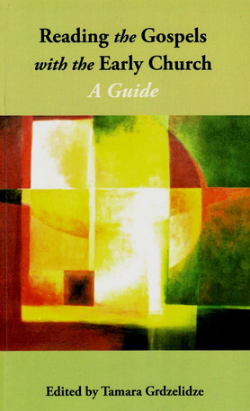Reading the Gospels with the Early Church
Insights from early Christian teachers
 Reading the Gospels with the Early Church. A Guide
Reading the Gospels with the Early Church. A Guide
Tamara Grdzelidze (ed),
WCC Publications, Geneva, Faith and Order Paper
ISBN: 978-2825415856
Reviewed by Alec Gilmore
Bring together half-a-dozen Faith and Order ecclesiastics (Catholic, Orthodox and Reformed), to unpack the life and work of the Early Church Fathers, invite Mary Tanner to introduce their findings and this is the result.
How did these Fathers reflect on scripture so as to respond to the challenges of their day and what fresh lines of exegesis might they offer us facing not dissimilar challenges, such as how to address an ecumenical church in a multi-cultural world?
Not a lot, you might think. And if you are looking for simplistic ideas for next Sunday morning you could be right, but treat their work as a different approach to the text leading to a different set of questions and your quest could be tough but also rewarding.
There are six sections and six gospel themes, each in five parts: a gospel passage, a patristic text/s, information on the author/text, an outline of a group work, and a prayer.
Chrysostom, on the Sower, reminds us that wealth (economics) has to be balanced by a virtuous life (a moral dimension). Ambrose of Milan sees the Prodigal Son as a man ‘in exile from himself’ until in the end he ‘returned to himself’. Ephrem the Syrian, a Turkish refugee, on wine at Cana, goes for the spiritual rather than the historical.
Origen, on Mary and Martha, bypasses the more usual ‘action and contemplation’ for ‘spiritual and somatic’, reflecting current discussions on Faith and Order versus Life and Work, or doctrine versus social action.
Hyppolitus, on Mary Magdalene, brings together Song of Songs 3:1-4 and Mark 16:6 in a 3rd century attempt to rediscover the resurrection narratives of the gospels, focusing on women in the church, celebrating their love for Jesus by reference to the Old Testament (Song of Songs), and reading the empty tomb through the lens of Genesis (‘the “undoing” and “remaking” of the story of Eve’).
Overall, the message is one of encouragement, to identify the characters to whom we make the strongest response followed by similar instances in our own experience, and then put them alongside and enable them to speak to and question one another.
The Revd Alec Gilmore is a Baptist minister
Baptist Times, 17/07/2015